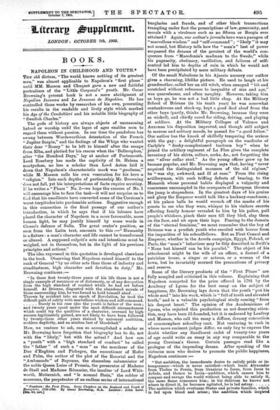on the face, and sit upon their laps. Passing to
the domain of the "eternal feminine," we must remember that the boy of Brienne was a prudish youth who recoiled with horror from the impurities of his schoolfellows. But as First Consul and Emperor, whether in the Arcola campaign, Egypt, Poland, or Paris, the "man's" behaviour may be fitly described in Swift's "None but himself can be his parallel." The object of his attachment might be the wife of an officer, a damsel of a patrician house, a singer or actress, or a woman of the town, but he invariably scorned the precautions of privacy and reserve.
Some of the literary products of the "First Phase" are fully sampled and criticised in this volume. Explaining that Napoleon competed for the prize offered in 1791 by the Academy of Lyons for the best essay on the subject of happiness, Mr. Browning lays down that the youth "put his whole soul" intnhis work, which is "full of truth and elevated truth," and is a valuable psychological study coming "from his deepest heart." The opinion- of the Academicians of Lyons, who rejected this production as not deserving atten-


























































 Previous page
Previous page